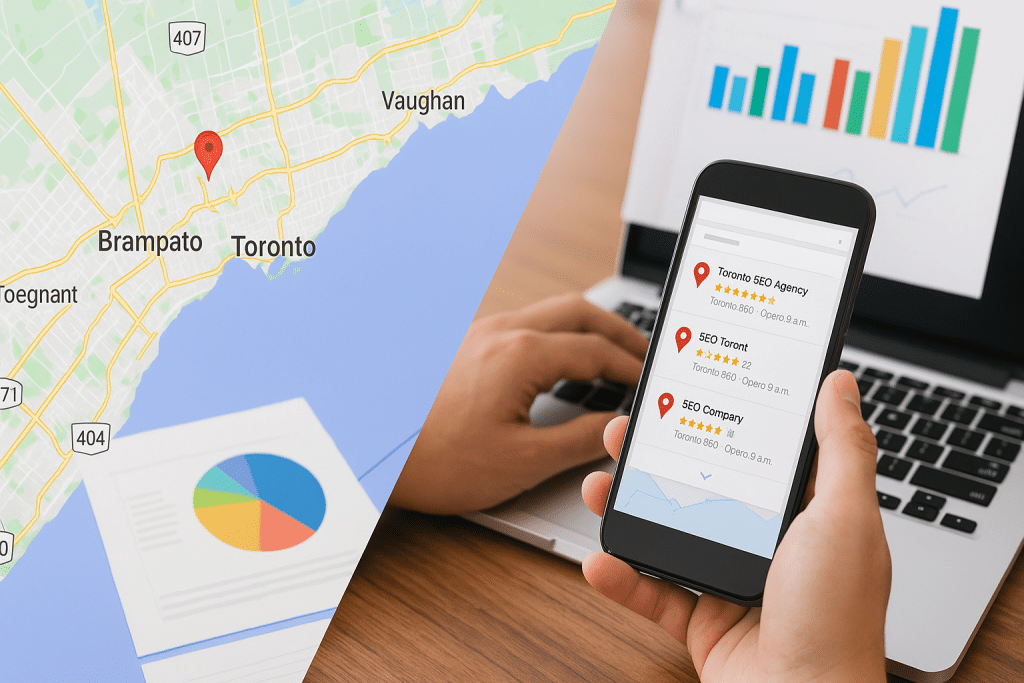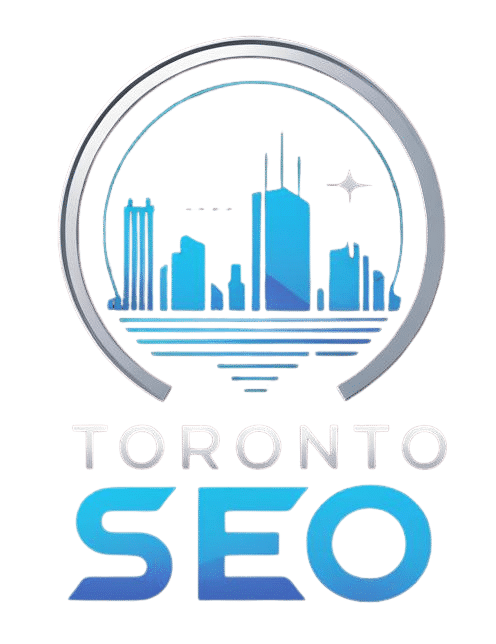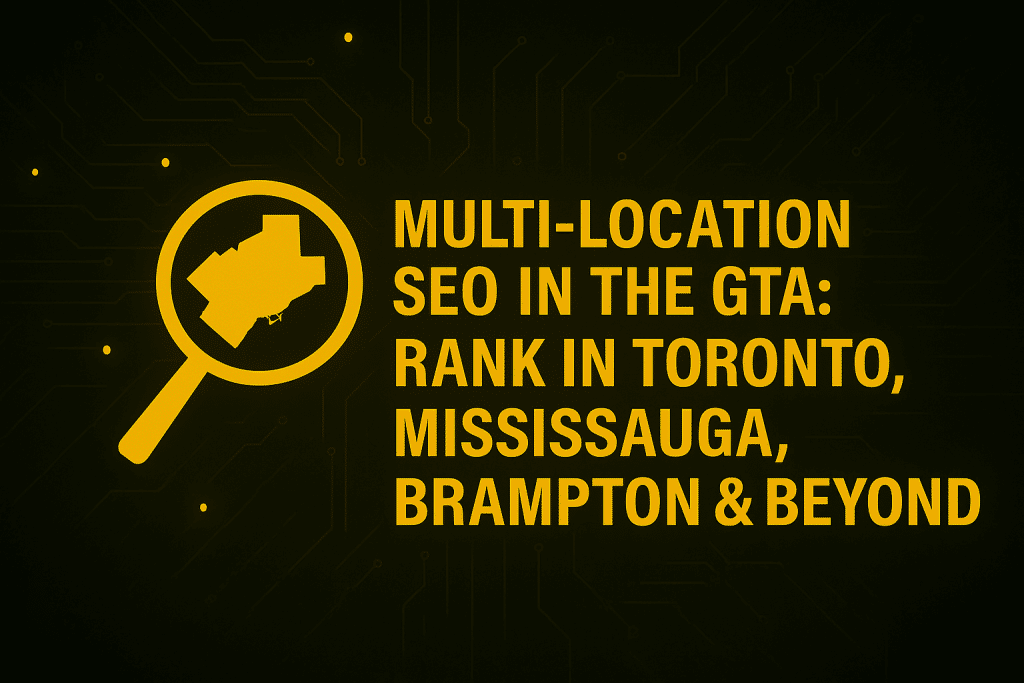Expanding your business across the Greater Toronto Area (GTA) requires more than opening new locations — it demands a strong, localized digital presence. Multi-location SEO helps businesses rank in multiple cities simultaneously while maintaining consistent branding and maximizing search visibility. From Toronto’s downtown core to Mississauga’s business hubs and Brampton’s diverse communities, strategic SEO ensures you show up where your customers are searching.
Why Multi-Location SEO Matters in the GTA
The GTA is one of Canada’s most competitive business environments. Millions of residents rely on Google Maps, local searches, and mobile-first queries to make purchasing decisions. Businesses with multiple branches must optimize each location individually to appear in search results like:
“Best dentist in Mississauga near me”
“Toronto moving company downtown”
“Brampton SEO services open now”
Without targeted multi-location SEO, even well-established businesses risk losing visibility in local 3-pack map results and organic listings. According to Google’s data, over 70% of people who search for local services visit a business within 24 hours. Ranking in each GTA city isn’t optional — it’s essential for growth.
Building a Strong Local SEO Foundation
Google Business Profile Optimization
Each location must have its own Google Business Profile (GBP). A complete and verified GBP ensures your business shows up in map searches. Include unique:
NAP (Name, Address, Phone Number) for each branch
Categories tailored to services offered in that city
Photos of storefronts, staff, and customer experiences
Localized posts and updates
For example, a digital agency in Toronto can highlight downtown client success stories, while its Mississauga branch can showcase suburban businesses thriving with their SEO support. Learn more about best practices in Google Business Profile optimization.
Location-Specific Landing Pages
A powerful strategy for GTA businesses is creating dedicated landing pages for each branch. These pages should feature:
City-specific keywords (“SEO services in Mississauga,” “Toronto ecommerce SEO”)
Local testimonials and case studies
Driving directions and neighborhood references
Embedded maps for quick navigation
Internal linking can enhance authority. For example, when discussing service quality, link to Top SEO agencies in Toronto using AI to outrank competition. This strengthens topical relevance and keeps users engaged.

Consistent Citations and NAP
Citations (business directory listings) remain critical. A Mississauga listing that uses a different phone number than the one on your website can confuse Google and harm rankings. That’s why citation building is a core part of any GTA SEO strategy.
Keyword Research for Multiple GTA Cities
Geo-Modified Keywords
Keyword intent changes by city. Ranking for “SEO services Toronto” doesn’t automatically help you capture “SEO services Brampton.” Conduct intent-first keyword research for each city to identify high-converting opportunities, as explained in Toronto keyword research strategies.
Examples:
Toronto: “Downtown SEO experts,” “SEO for Toronto startups”
Mississauga: “Mississauga ecommerce SEO,” “SEO consultants near Square One”
Brampton: “Affordable SEO Brampton,” “SEO for Brampton small businesses”
Service + Location Keywords
Combine core services with location modifiers for maximum reach. A law firm with branches across GTA should rank for:
“Family lawyer Toronto”
“Immigration lawyer Mississauga”
“Criminal lawyer Brampton”
This not only attracts clicks but increases conversions since users searching with city names are usually ready to act.
Localized Content Marketing Across the GTA
City-Focused Blog Posts
Publishing localized blog content builds topical authority. For instance, an SEO agency can write about Toronto SEO trends for 2025 while also addressing Brampton’s small business growth challenges. When paired with insights like understanding Google’s latest algorithm updates, your content becomes a trusted regional resource.
Customer Success Stories
Highlight local success. Share how you helped a Mississauga business triple organic leads, similar to this Toronto case study. Prospects relate to businesses in their own city and industry, making your brand appear more approachable and relevant.
Localized Events and Guides
Cover city-specific events, challenges, or regulations. For example:
“How Toronto’s AI-driven digital landscape impacts local SEO”
“Mississauga business grants and SEO growth opportunities”
“Brampton entrepreneurs: optimizing for mobile-first searchers”
By weaving external resources such as Canada.ca business growth programs into your content, you align with authoritative sources while offering value to readers.
Technical SEO for Multi-Location Sites
Schema Markup for Local SEO
Implement LocalBusiness schema for each branch. This structured data signals to Google which location matches a user’s search. Add attributes like service area, geo-coordinates, and reviews to strengthen rankings.
Mobile-First Optimization
Since most local searches happen on mobile, every location page must be fast, responsive, and mobile-friendly. Use Core Web Vitals optimization as detailed in Toronto technical SEO audits.
URL Structure
Adopt clear and scalable URLs such as:
yoursite.com/toronto/yoursite.com/mississauga/yoursite.com/brampton/
This helps search engines differentiate content while creating a logical user journey.
Backlink Strategies for Multi-City Authority
High-authority backlinks remain essential for competing in Toronto, Mississauga, and Brampton. Techniques include:
Partnering with local chambers of commerce
Sponsoring community events in each city
Earning press mentions through PR-SEO integration
Learn how agencies succeed with this dual approach in PR vs SEO Toronto strategies. For additional credibility, reference external resources such as Moz’s local SEO ranking factors.
Analytics and Tracking for Each GTA Location
Tracking all GTA branches in one dashboard ensures clarity on which cities perform best. Use UTM parameters, Google Analytics 4, and call-tracking systems to monitor:
Phone calls per branch
Click-through rates on local listings
Conversion rates by city
Agencies already optimize this through strategies like tracking SEO performance with analytics.
Conclusion: Owning the GTA Market with Multi-Location SEO
Ranking in Toronto alone is no longer enough. To dominate the GTA, businesses must execute city-focused SEO strategies tailored to Toronto, Mississauga, Brampton, and beyond. From Google Business Profiles to localized landing pages, schema markup, and analytics, the businesses that invest in multi-location SEO secure consistent visibility, brand trust, and growth.
For tailored SEO solutions that help your brand expand across the GTA, contact us today.


